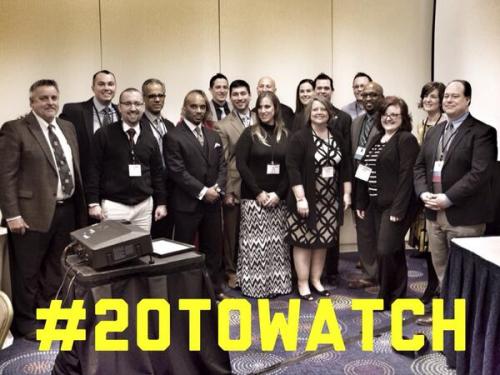Learning From the “20”
by mistermchem
As if I could possibly be reminded more why I love my job, I had the opportunity to get to know 17 of the country’s most esteemed educators last week at the CoSN Conference in D.C. From digital snow days to maker spaces, there is a lot to learn from these people. Here, in nor particular order, are my observations from the “20 To Watch” experience.
We Need to Solve Simple Problems First
There were some stories of people revolutionizing their whole district, like Roger Cook’s, but for the most part, the “20” did something that schools need a lot more of, and that was effectively and efficiently solving simple problems. Too much school lost for snow days? Invent a way to keep credit for them with technology. Implementing 1:1? Make sure your school is actually ready for it before throwing devices at students and teachers. Notice a subject area with a lack of technology implementation? Work with them to invent new ways to incorporate it into their curriculum. Even my own story is an example. We noticed students and teachers wanted a digital planner that actually works. So we made one. These are not revolutionary ideas, and one of ed tech’s biggest problems is that there are too many bad products trying to solve problems that either don’t exist or are too big. We need to refocus our attention on small problems and evaluate products that will actually solve them.
Big Change Requires Strong and United Leadership
I asked all of the superintendents and administrators being recognized the same question, which was, “how united were the administrators in your district?” This was a carefully nuanced and detailed question, because “united” is different than the more common question, which involves the word “supportive”. Being supportive to someone is relatively easy. You congratulate them, encourage them, and celebrate their achievements with them. Being united is hugely different. A united team of administrators all work to accomplish the same goals every day. They all perform different tasks towards achieving that goal, but the goal is shared and well communicated throughout the district. Every administrator emphasized the importance of a united team when I asked them this question, and I couldn’t agree more. Teachers should learn to work in united teams as well, because we tend to shy away from working for the same cause and that’s a deterrent on our own work.
Not Just Great Educators
This group of outstanding teachers and administrators is also a great group of people full of personality, ambition, and kindness. It’s easy to look at colleagues and to isolate oneself socially for one reason or another, but one of my favorite parts of this job is the wildly diverse backgrounds, stories, and personalities associated with each of us. If the “20 to Watch” are filled with these individuals, then there are plenty working in your school too. I plan on getting to know more of my colleagues as a result of this recognition, and you should too.
If You’re Not Blogging Already, Start
Another common trend amongst many of the “20” was that we all had important and valuable lessons to share about teaching and learning. This is a common trend for most teachers who care about their students in the slightest. Unfortuantely, we don’t all share these experiences with each other and we should. The best way to do that? Start blogging. Don’t worry about your audience, who’s reading, or any of the imaginary internet nonsense, just write. Write about anything that inspires you on a day to day basis. You never know when you’ll make a new friend on the internet, which is how most of our socialization gets done these days.
There are many more lessons to be learned from this year’s group of outstanding educators. Personally, I hope to see everyone at NSTA, CSTA, and ISTE in the coming months to learn more.
